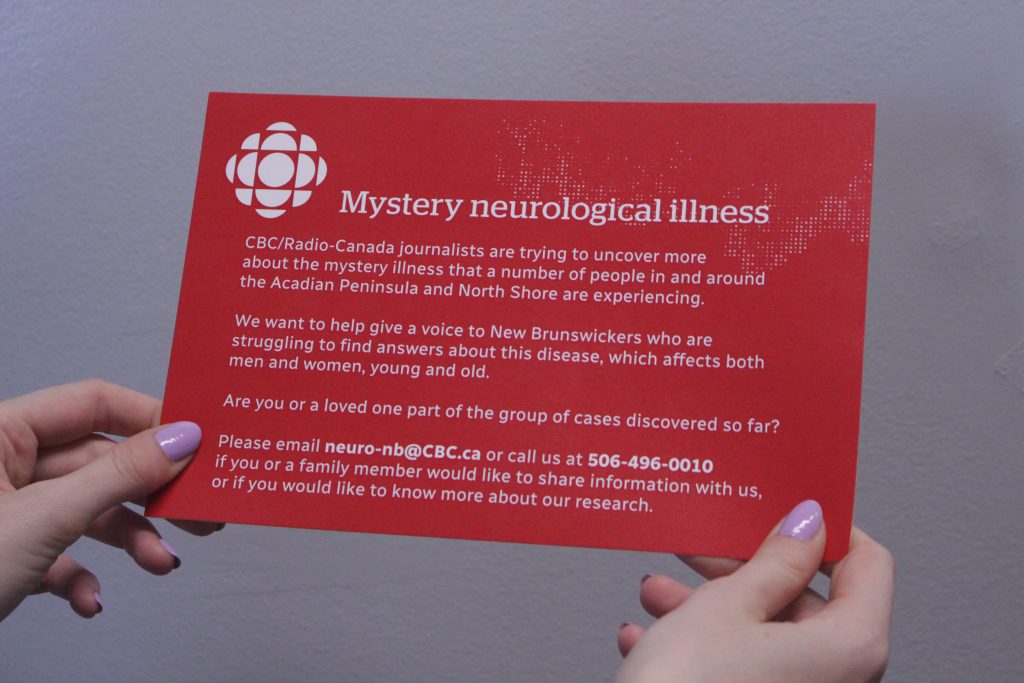In mid-July, Canada Post began delivering about 50,000 postcards for CBC News and Radio-Canada to mailboxes in New Brunswick’s Acadian Peninsula and North Shore areas.
The postcards highlight a potentially deadly mystery illness first reported in 2015 but only publicly revealed by health officials this March. The cards also direct people impacted by the illness, which has infected 48 and killed six, to contact journalists, who hope to learn more about what officials are calling the “New Brunswick Cluster of Neurological Syndrome of Unknown Cause.”
“The suffering is immense … because it’s beyond physical,” Alier Marrero, a Moncton, N.B.-based neurologist working at Dr. Georges-L.-Dumont University Hospital Centre, told the Washington Post earlier this spring. “There’s also the neuropsychiatric and moral suffering of the patients that is only partially relieved by medications.”
Marrero is working with scientists and doctors from Canada and abroad to uncover more about the illness, whose symptoms include rapidly progressing dementia, behaviour changes, muscle spasms, balance issues, difficulty walking, pain in the upper or lower limbs, blurred vision and visual hallucinations.
The first registered case occurred in 2015 with another 11 and 24 cases reported in 2019 and 2020, respectively. The disease has affected all age groups, as well as males and females, equally, according to the initial memo released by New Brunswick’s public health officials in March. Roughly half of the infected individuals are between age 50 and 69.
“The investigation team is exploring all potential causes, including food, environmental and animal exposures,” according to the provincial public health website. “At this time, there are no specific behaviours or foods that have been identified to avoid.”
The national Creutzfeld-Jakob Disease (CJD) Surveillance System identified a pattern of symptoms among patients in 2020 before human prion diseases – such as CJD – were ruled out. In March, Michael Coulthart, the head of the CJD Surveillance System, raised the possibility of chemical exposures to environmental toxins driving the cluster.
“One toxin that has come under scrutiny is beta-Methylamino-L-alanine, which is produced by cyanobacteria, or blue-green algae blooms,” adds the Post story. “Another is domoic acid, a naturally occurring toxin produced by certain types of algae, that was responsible for a deadly contaminated seafood outbreak in Canada in 1987.”
With all of the infected individuals’ CJD tests returning as negative, researchers are also theorizing the mystery illness could be caused by an entirely new prion disorder, according to the Post story.

The CBC postcards are doubled sided, with French text (shown) on one side and English on the other. Submitted photo.
CBC POSTCARDS
CBC News describes the postcard project as a “fact-finding mission” and “not a clinical investigation.”
Journalists with CBC News and Radio-Canada in New Brunswick, as well as CBC’s national investigative documentary program The Fifth Estate, are investigating the experiences of people involved in the cluster plus the response from provincial and federal public health officials.
This May, citing concern about health officials’ lack of transparency, several New Brunswick families began speaking out with a message later echoed by BloodWatch, a national non-profit organization in the 1980s, following a tainted blood disaster in which thousands of people were exposed to HIV and hepatitis C through contaminated blood products.
In an open letter to New Brunswick Health Minister Dorothy Shephard and federal Health Minister Patty Hajdu, BloodWatch co-founder Kat Lanteigne wrote public health officials’ lack of transparency is “troubling.”
“As Ministers of Health federally and provincially your roles demand a formal duty of care to the public,” added Lanteinge’s open letter.
She later told Global News: “What the governments always say is, ‘We don’t want to scare people.’ Our argument is you’re not scaring people, you’re informing them.” She added the mystery illness should be considered a national public health crisis with a response similar to the one used for the COVID-19 pandemic.
The public health investigation is ongoing.

